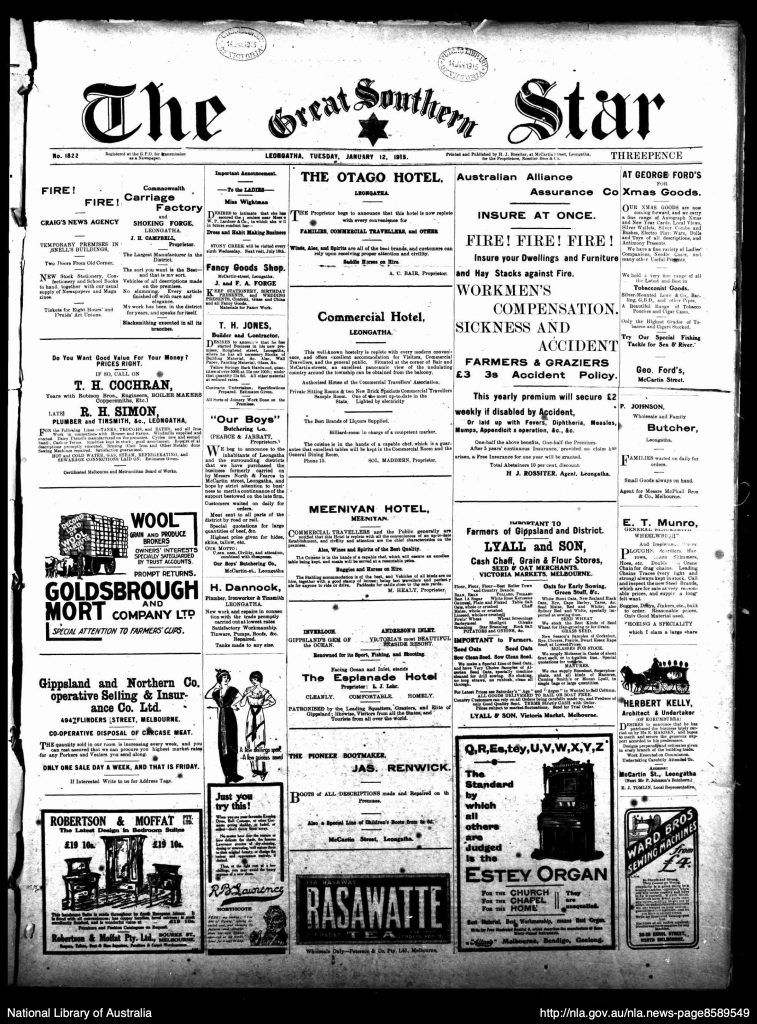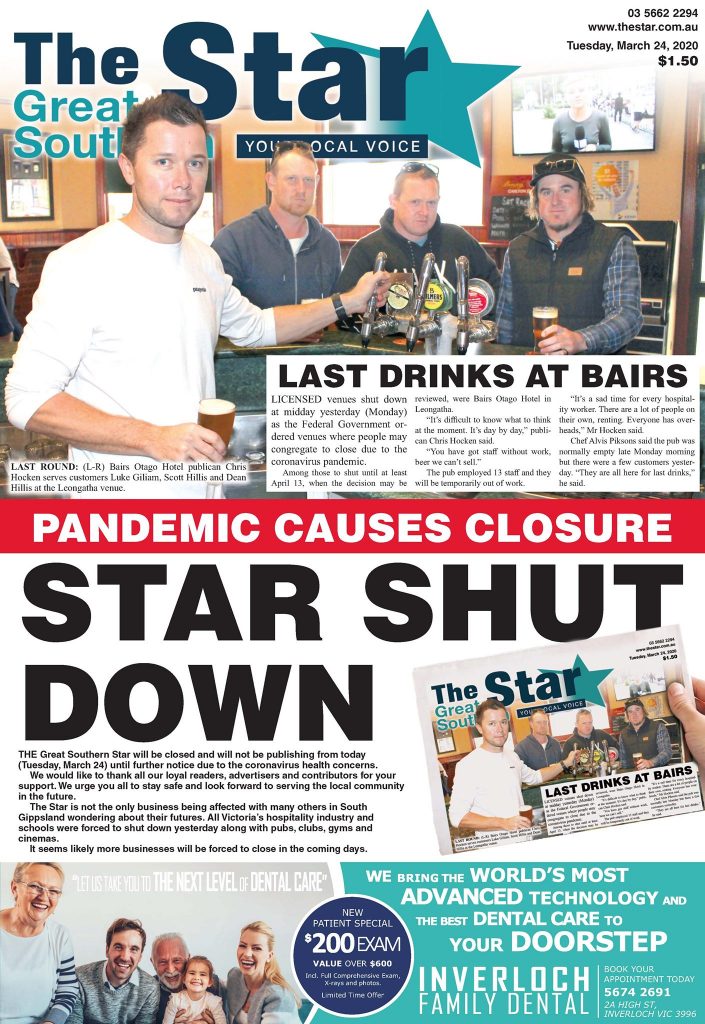The Great Southern Star, affectionately known simply as “The Star”, has served the South Gippsland community for 130 years.
It has survived world wars, depression and drought, but the COVID-19 pandemic proved too much for it, and The Star ceased publication on March 24, 2020.
The weekly paper had published each Tuesday since 1890 and covered the South Gippsland Shire.

The Great Southern Star front page Tuesday January 12, 1915. Sourced: https://trove.nla.gov.au/
In a statement on its final front page, The Star wrote, “we would like to thank all our loyal readers, advertisers and contributors for your support. We urge you all to stay safe and look forward to serving the local community in the future.”

The Great Southern Star
Tuesday, March 24. Photo: The Great Southern Star.
But MEAA president Marcus Strom was not convinced.
“Shutting down in advance of the benefits they are to receive from the government stimulus packages, is a knee-jerk reaction,” Strom said.
In response, The Star’s general manager Tony Giles said, “the union are doing their job. They’ve got to defend their journalists, their members. But sometimes they [MEAA] are a bit devoid of the reality”.
Lack of advertising revenue and competition with the neighbouring paper The Sentinel Times put financial pressure on The Star, Mr Giles said.
“The businesses and retailers were finding it hard to allocate their spend across two newspapers, it’s a very unusual situation to have two newspapers so close together.”
Many businesses in Leongatha have experienced financial difficulty which has been compounded by COVID-19, and simply don’t have the money to spend on newspaper advertising.
Leongatha Business Association president Anthony Walls said, “it’s a hard gig but The Star used to do it really well. It’s sad to see an iconic business come to an end, 130 years is a long time to be in business”.
The Sentinel Times, which is also partly owned by the Giles family, is going to fill the gap The Star has left behind.
“We’re not abandoning the region, and far from it,” Mr Giles said.
“We think the decision will strengthen one paper in the area in South Gippsland and actually make it a better product, it’ll have less competition. We think it’s a good move for journalism in South Gippsland, to have a really strong paper operating.”
The mass closure of papers around Australia has been framed as an event that would predominantly affect elderly people.
In the 2016 census, nearly 20 per cent of households in South Gippsland said they did not access the internet from home.
Deakin University Associate Professor of Communication Dr Kristy Hess said it’s important particularly during a pandemic that elderly people had access to vital information in ways they are able to access.
“I’ve had a lot of calls from people where their newspaper has closed momentarily and gone online, they’re very devastated because they don’t feel comfortable navigating digital space.”
The Leongatha Nextra newsagency owner Peter Watchorn, who has lived in the town for 45 years, said many people still bought the physical paper.
“Our township probably has an older demographic, and they like their old format newspaper, so I still sell a lot of Herald Sun and do a lot of home deliveries,” he said.
South Gippsland has a predominantly ageing population, the 2016 Census revealed the largest age group was 65 to 69-year-olds.
Leongatha Senior Citizens Club secretary Ian Rasmussen said The Star’s closure would affect all the members of the club.
“Pretty much all of our members used to buy the local paper. Very few are computer literate to go online, so they relied on getting their local news in the paper.”
But Dr Hess said local news was not just for the benefit of elderly people, but for all local community members.
“Local journalists keep the powerful accountable, but at the same time a local journalist also connects people with each other.”
In the wake of The Star’s closure, the Leongatha community rallied around Matt Dunn, a former journalist at The Great Southern Star who started his own online paper.

Pictured are Jane Gardner, Matt Dunn and Nick Jeremiah. The Paper staff. Photo: Mark Drury Photography
“When I was stood down, I started posting local news items to Facebook, I was 99% sure that The Star wasn’t coming back. I basically took it upon myself to keep people informed on what was happening locally and it just started to gather momentum,” Dunn said.
Dunn built a solid following on Facebook and very quickly his new outlet simply called The Paper had amassed nearly 4,500 likes.
“It’s sort of untested waters, there’s a hardcore fanbase for print media in this region but I’m not sure if it’s a sustainable model anymore, which is a bit sad because I’ve grown up with as a print lover.”
Economic hardship and new technology have impacted traditional media, but Leongatha locals like Dunn and Mr Giles are determined to see regional news continue.
“Local papers are totally essential. I honestly think the local news outlet is something that helps knit the community together,” Dunn said.
—
Cover Photo by Utsav Srestha on Unsplash







